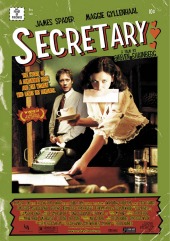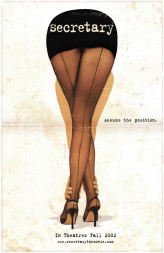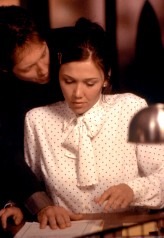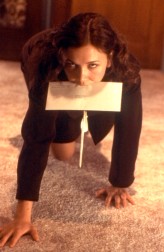|
Secretary
|
| |
 |
USA, 2002. Rated R. 104 minutes.
Cast:
Maggie Gyllenhaal, James Spader, Jeremy Davies, Lesley Ann Warren, Stephen
McHattie, Jessica Tuck, Oz Perkins, Amy Locane, Patrick Bauchau, Mary
Joy, Michael Mantell, Lily Knight
Writers: Erin Cressidy Wilson (screenplay and story adaptation)
and Steven Shainberg (story adaptation), based on the story by Mary Gaitskill
Music: Angelo Badalamenti
Cinematographer: Steven Fierberg
Producers: Steven Shainberg, Andrew Fierberg, Amy Hobby
Director: Steven Shainberg
LINKS
|
Review
 film
sure to create controversy, Secretary is a romantic comedy in the way
that Ghost World is a teen movie, or
that Fight Club is a buddy picture.
Many viewers will have a tough time checking their political baggage at the
door. Some will be unable to overcome their distaste for alternative sex, while
others will focus on the power imbalance between the two protagonists, even
though the imbalance is entirely illusory. All will miss the point and fail
to appreciate the passion, humor, and unorthodox eroticism of an unexpectedly
tender film about a most unusual relationship. It begins when a complicated
but inconspicuous young woman (Maggie Gyllenhaal) takes a secretarial position
with the inscrutable Mr. E. Edward Grey (James Spader). As the film basks in
the sumptuous atmosphere of the otherworldly law offices and the protagonists
inch closer to each other, we gradually learn who they are.
film
sure to create controversy, Secretary is a romantic comedy in the way
that Ghost World is a teen movie, or
that Fight Club is a buddy picture.
Many viewers will have a tough time checking their political baggage at the
door. Some will be unable to overcome their distaste for alternative sex, while
others will focus on the power imbalance between the two protagonists, even
though the imbalance is entirely illusory. All will miss the point and fail
to appreciate the passion, humor, and unorthodox eroticism of an unexpectedly
tender film about a most unusual relationship. It begins when a complicated
but inconspicuous young woman (Maggie Gyllenhaal) takes a secretarial position
with the inscrutable Mr. E. Edward Grey (James Spader). As the film basks in
the sumptuous atmosphere of the otherworldly law offices and the protagonists
inch closer to each other, we gradually learn who they are.
Even those not predisposed to the appetites depicted may find the film sexy,
because Secretary is not a movie about fetishism. It is a movie about
passion. It is also a tease. A patient film that never drags, Secretary
caringly nurtures its story, relishing every moment and prolonging the audience's
anticipation as it luxuriates through its hour and three quarters running time.
It is that rare romance that leaves you never knowing what to expect next and
eager to find out--provided you don't read too much about the film beforehand.
 Analysis
Analysis
Readers who have not yet seen Secretary are encouraged to read this
analysis after viewing the film. The analysis discusses the whole of the film,
including the ending.
Secretary reveals its eccentricities right away. In the thoroughly bizarre
opening scene, we encounter Lee Holloway (Maggie Gyllenhaal) in prim business
attire, wearing a collar with a horizontal pole extending from it to her left
and right. Her hands are cuffed to each end, so that she looks crucified. Thus
restrained, she floats through an opulent office awash in vibrant hues, performing
menial secretarial tasks. She staples with one hand and fixes coffee with the
other. She grabs a sheet of paper from a typewriter with her teeth, and disappears
down the hall. The anomaly isn't the fetishistic gear she is wearing, however.
It is the peaceful look of contentment on her face.
Secretary flashes back six months. We meet Lee again, looking distinctly
plainer, as she departs a psychiatric institution where she has spent six months
for habitually cutting herself. She returns home, where she attends her unappealingly
conventional sister's conventional wedding. These few minutes are so banal by
comparison to the opening--and distinctly less color-saturated--that the mind
is tempted to set the introduction aside as a surreal dream, or a metaphor.
Surely the prologue cannot be meant literally. Because Secretary
lures you into ignoring the beginning, what happens later is no less shocking
than if the introduction had been omitted. In one pre-release screening, there
were audible intakes of breath when Mr. E. Edward Grey (James Spader) first
spanks Lee.
Mr. Grey is a nightmare boss. The first questions he asks of Lee in her job
interview are enough to justify a mammoth sexual harassment lawsuit that would
make the Clarence Thomas hearings look like one of Larry King's slow-pitch interviews.
Every query is illegal. Are you pregnant? Do you plan to get pregnant? Do
you live in an apartment? On and on, he probes Lee's personal life. Poor
naïve Lee responds gamely. When Mr. Grey warns her that the work is boring,
she becomes more spirited, insisting that she wants to be bored. A simple
secretarial position is ideal--a job that will enable her to become more adult
without complicating her life. All she has to do is follow instructions and
perform mundane tasks.
Mr. Grey's requirements of Lee, however, become outlandish and demeaning. Because
only typewriters are permitted in his palatial offices--none of those new-fangled
word processors--Lee must retype letters in their entirety when she makes mistakes.
These Mr. Grey enthusiastically circles with red markers, thrusting the letters
back in her face. He deploys Lee to the dumpster to fetch a folder, only to
tell her he has found another copy when she returns. He pitches Lee's gift of
donuts into the trash without regard for her feelings. He orders Lee to stop
sniffling and start wearing a hair net, because he can't stand her playing with
her hair. We grow more and more horrified, not yet realizing that there is something
else going on here.
The signs are there, however--the previous secretary's tearful exit as Lee
arrives; Mr. Grey's oddball reaction whenever Lee follows an unreasonable order
without complaint (and his erratic behavior in general); his futile attempts
to control the impulse to assault Lee's work with the red marker. There are
signs, too, that Mr. Lee is no monster--his fastidious cultivation of his resplendent
plants; the way he carefully frees the mice he catches in his Have-A-Heart traps,
unharmed. His surrealistically opulent offices become an exotic haven for Lee.
(Tangentially, why does a two-person office have a bathroom with stalls?)
We don't yet see that Lee and Mr. Grey are forging a strong psychological and
sexual bond. Though Lee doesn't yet understand it either, Mr. Grey is giving
her what she wants, perhaps even needs. Their profound connection first emerges
when Mr. Grey helps Lee turn her back forever on self-mutilation. Mr. Grey forces
her to discuss it, demonstrating that he understands exactly why she cuts herself
in the brief monologue that tumbles out of him. Is it that sometimes the
pain inside has to come to the surface? Yes. And when you see evidence
of the pain inside, you finally know you are really here? Yes. Then when
you watch the wound heal, it's comforting, isn't it? Yes, it is.  Mr.
Grey announces gently but firmly that Lee is not going to do it anymore. It
is in the past. Walking home after their exchange, Lee observes in the voiceover
narration that she feels nurtured and held by Mr. Grey.
Mr.
Grey announces gently but firmly that Lee is not going to do it anymore. It
is in the past. Walking home after their exchange, Lee observes in the voiceover
narration that she feels nurtured and held by Mr. Grey.
It is preposterous to think that someone who has been cutting herself since
the seventh grade can just stop at someone's say-so. Previous efforts to conquer
her compulsion, including her six-month commitment, have all spectacularly failed.
The very first day out of the institution, she's pressing a boiling teapot against
her thigh, driven to the compulsion by yet another tussle between her alcoholic
father and battered mother. Yet Mr. Grey's tack works. It works, because it
is an order from him, and Lee's desire to do what he says has become
stronger than the other compulsion. Mr. Grey must sense it, because the very
next day, he summons Lee into his office for her first spanking. Their relationship,
with Mr. Grey as the dominant and Lee as the submissive, is finally explicit--but
not overtly sexual. Not yet.
One could argue that Lee has merely replaced one self-abnegating compulsion
for another. That might even be true…if the dominant were someone other than
Mr. Grey. He grasps immediately that there's something unusual about Lee, remarking
on it in their job interview. There's something about you. You're…closed.
"I know," Lee admits. Mr. Grey may have his own needs to feed, but he is attuned
to Lee like no one else in her life--not her parents, not her sister, and most
certainly not her ineffectual, wimpy suitor, Peter (Jeremy Davies), whom everyone
assumes is a perfect match for Lee because he is similarly mousy and shy. Lee's
counselor at the institution (Patrick Bauchau) might understand Lee, but he's
not in the film long enough to evaluate their rapport.
Despite their S&M role playing, we never once sense that Lee is unsafe with
Mr. Grey--the contrary appears to be true. With him, she is learning to accept
herself and to express her masochism in less harmful activities. As a contrast,
Secretary offers the horrifically abusive relationship between Lee's
parents. What Lee has with Mr. Grey isn't anything like it.
Mr. Grey, however, does not accept himself. Like Lee, he struggles against
conventional notions about what is normal. Even though Lee makes it ever more
obvious that she is a keen participant in their games, a part of him is still
imprisoned by socially-imposed inhibitions. He stops for a time, but Lee provokes
him ever more strongly by "misbehaving," finally resorting to giving him an
earthworm in an envelope. It's too much for Mr. Grey--he masturbates onto her
bare bottom instead of spanking her, but he still can't acknowledge to Lee his
sexual and emotional need for her. The look Lee gives him afterward is one of
pity.
Mr. Grey loathes himself so much that he cannot believe that Lee really craves
what he gives her. Maybe she's just weak. Maybe she's so unable to stick up
for herself that she can't say no. Mr. Grey may be the dominant, but he is even
more insecure than Lee. Wracked with guilt, he goes so far as to fire Lee, because
he says he won't stop if he doesn't. "I'm sorry. I don't know why I am this
way," Mr. Grey apologizes. Lee is furious--no evidence of the weakling she is
supposed to be--yet Mr. Grey still doesn't get it. "We can't do this 24 hours
a day," he argues. "Why not!?" Lee asks, to no avail.
Lee tries to replicate her relationship with Mr. Grey by meeting new partners
through the classifieds. They're slaves to their hilarious fetishes, however,
and not interested in Lee as a person. At the other end of the relationship
spectrum, Lee has a robust friendship with Peter, but no sexual chemistry. In
the climactic sequence of events, Lee finally thrusts Peter aside and returns
to Mr. Grey's office to declare she loves him. His response is to say she only
thinks she does.
The ending is about Lee proving otherwise. Mr. Grey orders Lee to sit with
her feet on the floor and hands flat on his desk. Then he summons Peter to his
office, assuming that Lee's fiancé will force her back to reality. Peter does
not. When he manages to dislodge Lee from her position at the desk, she actually
hits him. This is no meek wallflower--not anymore. During her employment at
The Law Offices of E. Edward Grey, she has matured, confident and in touch with
her needs.
Lee submits to Mr. Grey not from a position of weakness now, but from a position
of strength. When Lee says, "Because I want to," in response to Peter's question,
"Why are you doing this?" it is a definitive declaration of empowerment. She
sits at the desk because she wants to follow Mr. Grey's order, and because
she loves him. She is not being compelled to do anything. She is not ceding
control of her life to someone else (not that she ever had it to begin with, until
now).
This is the message Lee sends with her three-day vigil. During it, characters
from her life (and then some) pass through, pleading with her to give up and
come home. Even the local news shows up, until, finally, Mr. Grey returns to
carry her away, and they live happily ever after. 
Though Secretary ably delineates Mr. Grey's struggle with himself, it
could have done more to get close to him. What is the deal with his previous
secretaries, including the one we see in tears? Who is his ex-wife, who seems
to be able to order him around? What about the paralegal and her knowing
smile--what does she know? A film should not explain too much, but these lingering
uncertainties leave the final outcome in some doubt. Might Mr. Grey repeat the
pattern with his next secretary while his new bride waits at home, tied to the
bedposts?
Spader overcomes these few gaps in the script by communicating much of his
character's interior life wordlessly. Mr. Grey is the ultimate James Spader
Role, the part he has been playing in some form for twenty years--the corporate
prick, the preppie jerk, the creepy guy in the nice clothes. Spader is cast
to type, but at the same time Mr. Grey is a difficult character who requires
him to stretch unexpectedly and amuse us with subtle comedic skills we didn't
know he had.
The star, however, is Gyllenhaal, with her sweet unassuming face, liquid eyes,
and delightfully curling smile. She is fearless. She's funny and sweet, and
she transitions from meek and weak to strong and empowered without abandoning
her character's core identity--not an easy thing to do. It is a wonderful performance.
Secretary is funny, too. Quite funny. In addition to the understated
humor in the performances and language, screenwriter Erin Cressidy Wilson and
director Stephen Shainberg play around with anomalous and ironic juxtapositions.
One of the best is when Lee is hanging out by the pool with her sister and her
sister's friends, who discuss sexual harassment. One of them, they feel, should
sue her employer for making mild sexual insinuations. Lee enthusiastically pipes
up that Mr. Grey is representing a woman in a sexual harassment suit and is
an excellent lawyer. "He's the best!" Gyllenhaal delivers the line sincerely,
with nary a hint of the colossal irony in her remark.
Another big joke is when, during Lee's three days at Mr. Grey's desk, a woman
drops a pile of feminist literature in front of her and entreats her to read
about the struggle of women. Traditional feminist thinking, of course, would
see Lee's behavior as incompatible with feminine equality. The analysis would
be that Lee is objectified, used, and the repository of all Mr. Grey's abusive
male desires. There may even be a grain of truth in that, initially, but their
rapport blossoms into something much greater than a vehicle to fulfill frustrated
needs. The dynamics of their relationship are distinctly individual, and have
nothing to do with politics.
In any event, if the roles were reversed, the gender politics of the relationship
would not need to be discussed. The roles could easily be reversed. You could
make almost exactly the same movie with male Lee and a Ms. Grey…or with two
men…or with two women. Only when the male is dominant and the female is submissive
do people insist on seeing the relationship as an expression of society's patriarchal
power structure.
A tougher question is whether a healthy relationship can grow from desires
born of illness. Most mental health specialists would agree that Lee and Mr.
Grey's impulses could only be a product of abusive childhood experiences or
the like. What if they are? If sexual turn-ons are imprinted in our psyches
by our early formative experiences, there's little any of us can do to alter
them, which is why pedophiles should be locked up forever. The goal in most
other cases should be not to suppress them and deny our nature, but to channel
them healthily. There is nothing wrong with alternative sexuality, Secretary
argues, if it is consensual and no one gets hurt--no one who doesn't want to
get hurt, that is. When Lee reads a book about "coming out" as a dominant/submissive,
the movie makes the case that S&M is just another sexual preference among myriad
human desires.
Regardless of what you feel about S&M, it's hard to argue that Secretary
is not erotic. It's erotic to watch two people bond so intensely--their sexual
wiring is electric and through it, their ardor awakens. Shainberg wasn't able
to get funding in Hollywood, because as he puts it, this was not a "person overcomes
personal problem movie." Secretary embraces its characters instead of
condemning them or fixing them. Rather, Lee's "problem" leads to something beautiful,
two people communing in body and soul--a miracle under any circumstances.
Review
© September 2002 by AboutFilm.Com and the author.
Images © 2002 Lions Gate Films. All Rights Reserved.

 Analysis
Analysis
 Mr.
Grey announces gently but firmly that Lee is not going to do it anymore. It
is in the past. Walking home after their exchange, Lee observes in the voiceover
narration that she feels nurtured and held by Mr. Grey.
Mr.
Grey announces gently but firmly that Lee is not going to do it anymore. It
is in the past. Walking home after their exchange, Lee observes in the voiceover
narration that she feels nurtured and held by Mr. Grey.

